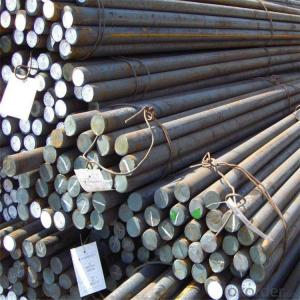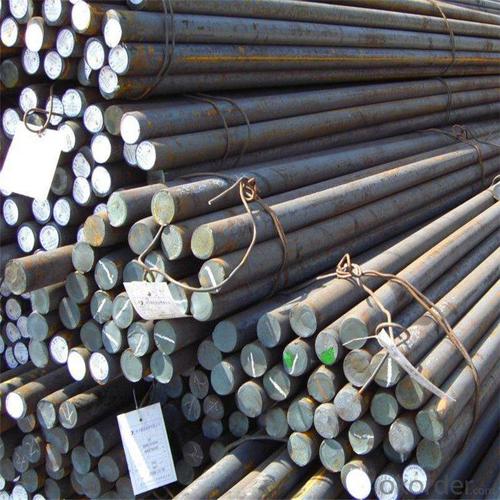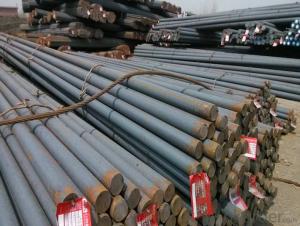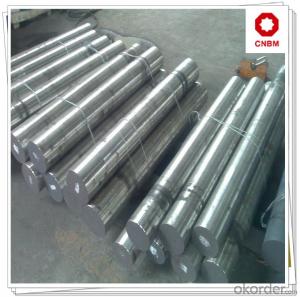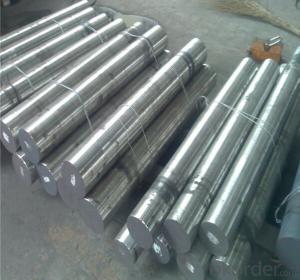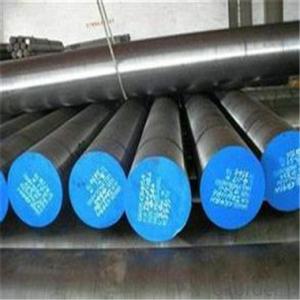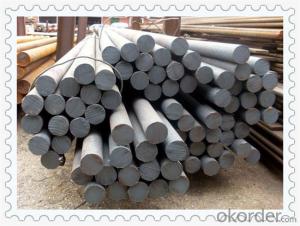Round Bars Carbon Steel SAE1020 AISI1020 S20C C22 S20CB
- Loading Port:
- Tianjin
- Payment Terms:
- TT OR LC
- Min Order Qty:
- 25 m.t.
- Supply Capability:
- 500000 m.t./month
OKorder Service Pledge
OKorder Financial Service
You Might Also Like
Specification
Round Bars Carbon Steel SAE1020 AISI1020 S20C C22 S20CB
Product Description of Round Bars Carbon Steel SAE1020 AISI1020 S20C C22
1. Steel grade: SAE1020, 20#, C22, S20C
2. Length: 6M-12M
3. Diameter: 16mm-300mm
4. Product range: round bar, flat bar, square bar
5. Technique: Hot rolled, forged, cold drawn
Specification of Round Bars Carbon Steel SAE1020 AISI1020 S20C C22 S20
Material | SAE 1020 | Round bar | Dia(mm) | 16-300mm |
Process | EAF + LF + VD + Forged + Heat Treatment (optional) | Length (mm) | Max 12m | |
Heat treatment | Normalized / Annealed / Quenched / tempered | Flat bar | Thickness(mm) | 8-500mm |
Delivery condition | Hot forged +Rough machined (black surface after Q/T)+ Turned (optional) | Width(mm) | 70-200mm | |
Test | Ultrasonic test according to SEP 1921-84 D/d | Length (mm) | Max 12m |
Chemical Composition of Round Bars Carbon Steel SAE1020 AISI1020 S20C C22
C | Si | Mn | Cr | Ni | Cu |
0.17~0.23 | 0.17~0.37 | 0.35~0.65 | ≤0.25 | ≤0.30 | ≤0.25 |
Photo Show of Round Bars Carbon Steel SAE1020 AISI1020 S20C C22
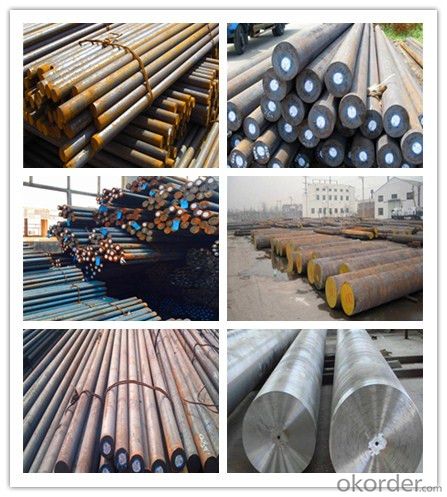
Packing and Delivery:
Packing in bundle package, or as customer's requirements.
Delivery Detail: 45 days after receiving the deposit.
Usage and Applications of Round Bars Carbon Steel SAE1020 AISI1020 S20C C22
1. Steel round bar is used in a large number of architectural and engineering structures. Or it can be used in construction of plants for the production of steel house frames, high-voltage transmission towers, bridges, vehicles, boilers, containers, ships, etc.
2. And we can use this kind of product on the performance of the mechanical parts if the demand is not very high.
3. Some special material steel round bar can be used for main shaft of steamer, hummer shank, with big section and supper force.
Company Information
CNBM International Corporation is the most important trading platform of CNBM group.
Whith its advantages, CNBM International are mainly concentrate on Cement, Glass, Iron and Steel, Ceramics industries and devotes herself for supplying high qulity series of refractories as well as technical consultancies and logistics solutions.


F A Q
1, Your advantages?
professional products inquiry, products knowledge train (for agents), smooth goods delivery, excellent customer solution proposale
2, Test & Certificate?
SGS test is available, customer inspection before shipping is welcome, third party inspection is no problem
3, Factory or Trading Company?
CNBM is a trading company but we have so many protocol factories and CNBM works as a trading department of these factories. Also CNBM is the holding company of many factories.
4, Payment Terms?
30% TT as deposit and 70% before delivery.
Irrevocable L/C at sight.
5, Trading Terms?
EXW, FOB, CIF, FFR, CNF
6, After-sale Service?
CNBM provides the services and support you need for every step of our cooperation. We're the business partner you can trust.
For any problem, please kindly contact us at any your convenient time.
We'll reply you in our first priority within 24 hours.
- Q: What are the different types of steel round bar heat treatments?
- There are several different types of heat treatments for steel round bars, each designed to enhance specific properties of the material. Some of the most common heat treatments include annealing, normalizing, quenching and tempering, and case hardening. 1. Annealing: This heat treatment involves heating the steel round bar to a high temperature and then slowly cooling it to room temperature. Annealing helps to relieve internal stresses, improve machinability, and increase ductility and toughness. 2. Normalizing: Similar to annealing, normalizing also involves heating the steel round bar to a specific temperature. However, instead of slow cooling, the bar is allowed to cool in air. Normalizing helps to refine the grain structure, enhance mechanical properties, and improve machinability. 3. Quenching and Tempering: Quenching is a process in which the steel round bar is heated to a high temperature and then rapidly cooled by immersing it in a quenching medium, such as oil or water. This rapid cooling helps to achieve high hardness and strength in the material. After quenching, the steel is often tempered by reheating it to a lower temperature, which improves toughness and reduces brittleness. 4. Case Hardening: This heat treatment is used to increase the surface hardness of the steel round bar while maintaining a tough core. Case hardening involves heating the bar in the presence of carbon-rich substances, such as gas or liquid carburizing agents. This results in a hardened outer layer, known as the case, while the core remains relatively softer and more ductile. These are just a few examples of the various heat treatments that can be applied to steel round bars. The specific heat treatment used depends on the desired properties and applications of the steel, and it is important to consult with metallurgical experts to ensure the most appropriate treatment is chosen for each specific steel round bar.
- Q: Can steel round bars be used in the telecommunications industry?
- Indeed, the telecommunications industry can make effective use of steel round bars. These bars are frequently employed to offer structural reinforcement for a range of telecommunications equipment, including antennas, satellite dishes, and communication towers. Notably resilient, these bars can withstand adverse weather conditions, rendering them well-suited for outdoor installations. Furthermore, the ease with which steel round bars can be fabricated and molded to meet precise design specifications enables the seamless integration of diverse components within the telecommunications infrastructure.
- Q: What is the maximum silicon content allowed for steel round bars?
- The maximum silicon content allowed for steel round bars can vary depending on the specific grade and application of the steel. However, in general, the maximum silicon content for most standard carbon and alloy steels used in round bars is typically around 0.35% to 0.45%. Exceeding this limit can lead to detrimental effects on the steel's mechanical properties, such as reduced toughness and increased brittleness. It is important to consult the relevant industry standards and specifications to determine the specific maximum silicon content allowed for a particular steel grade and intended use.
- Q: What are the different testing methods used for steel round bars?
- There are several testing methods used for steel round bars to ensure their quality and suitability for various applications. These methods include: 1. Visual Inspection: This is the initial step of testing, where the bars are visually examined for any visible defects, such as cracks, surface irregularities, or improper dimensions. 2. Dimensional checks: Steel round bars undergo dimensional checks to verify their diameter, length, and straightness. Precise measurements are essential to meet the specified requirements. 3. Ultrasonic Testing: Ultrasonic waves are passed through the round bars to detect internal defects, such as cracks, voids, or inclusions. This method helps identify potential weaknesses that may affect the structural integrity of the bars. 4. Magnetic Particle Inspection: This method uses a magnetic field and magnetic particles to detect surface and near-surface defects like cracks, seams, or laps. It is particularly useful in ferromagnetic materials such as steel. 5. Dye Penetrant Inspection: This technique involves applying a colored dye to the surface of the round bars and then wiping it off. The dye penetrates into any surface cracks or defects, making them visible under ultraviolet light. 6. Hardness Testing: This test measures the hardness of the steel round bars using methods like Rockwell or Brinell scales. It helps determine the material's ability to withstand external forces and ensures it meets the required hardness specifications. 7. Tensile Testing: Tensile strength testing is conducted to measure the maximum load a steel round bar can bear before it breaks. This test helps evaluate the material's strength and ductility. 8. Chemical Analysis: Chemical analysis is performed to determine the composition of the steel round bars, including the presence of elements like carbon, manganese, sulfur, phosphorus, and others. It ensures that the steel meets the required chemical composition standards. These testing methods are crucial in ensuring the quality, reliability, and compliance of steel round bars with industry standards and customer requirements. It is essential to perform a combination of these tests to ensure the overall quality and performance of the steel round bars in different applications.
- Q: What are the different cutting methods for steel round bars?
- There are several different cutting methods that can be used for steel round bars, depending on the specific requirements and equipment available. Some of the most common cutting methods include: 1. Sawing: This is one of the most basic and traditional methods of cutting steel round bars. It involves using a saw blade with teeth to cut through the metal. Sawing can be done manually with a hacksaw or powered by using a bandsaw or circular saw. It is a versatile method that can be used for both small-scale and large-scale cutting projects. 2. Shearing: Shearing is another common method of cutting steel round bars. It involves using a shear machine or hydraulic press to apply a high amount of force to cut the metal. This method is often used for cutting thick or heavy-duty steel bars. 3. Abrasive cutting: Abrasive cutting involves the use of an abrasive wheel or disc to grind away the metal and create a cut. This method is commonly used for cutting steel round bars with irregular shapes or for precision cutting projects. It can be done manually with a handheld grinder or using a machine like an abrasive cut-off saw. 4. Flame cutting: Flame cutting, also known as oxy-fuel cutting, uses a combination of oxygen and a fuel gas (such as acetylene or propane) to create a high-temperature flame that melts and cuts through the steel. This method is often used for cutting thick steel bars or for shaping metal. 5. Plasma cutting: Plasma cutting is a more advanced method that uses a plasma torch to cut through the steel. The plasma torch generates a high-velocity jet of ionized gas that melts and removes the metal. This method is commonly used for precision cutting, as it allows for greater control and produces cleaner cuts compared to other methods. It is important to note that the choice of cutting method will depend on factors such as the thickness and hardness of the steel round bar, the desired precision of the cut, and the available equipment and resources. It is recommended to consult with a professional or experienced metalworker to determine the most appropriate cutting method for a specific project.
- Q: Can steel round bars be used for making oil and gas industry components?
- Yes, steel round bars can be used for making oil and gas industry components. Steel round bars are commonly used in the oil and gas industry due to their high strength, durability, and resistance to corrosion. These components require materials that can withstand harsh environments, high pressures, and extreme temperatures, and steel round bars meet these criteria. They are commonly used to manufacture various components such as valves, flanges, pipes, and fittings, which are vital for the functioning of the oil and gas industry. Additionally, steel round bars can be easily machined and welded, allowing for the fabrication of complex shapes and structures required in this industry. Overall, steel round bars are a reliable and widely used material for making oil and gas industry components.
- Q: Can steel round bars be coated for added protection?
- Yes, steel round bars can be coated for added protection. Coating steel round bars helps to enhance their resistance against corrosion, wear and tear, and other environmental factors that may lead to deterioration or damage. There are various types of coatings available for steel round bars, such as hot-dip galvanizing, epoxy coating, powder coating, and zinc plating. These coatings provide a protective layer that acts as a barrier between the steel and the surrounding environment, preventing the steel from coming into direct contact with corrosive substances or abrasive elements. Coating steel round bars not only increases their longevity and durability but also improves their aesthetic appearance. Additionally, the choice of coating depends on the specific application, environment, and desired level of protection.
- Q: What are the corrosion resistance properties of steel round bars?
- Steel round bars have excellent corrosion resistance properties due to the presence of alloying elements such as chromium, nickel, and molybdenum. These elements form a protective oxide layer on the surface of the steel, which prevents the underlying metal from coming into contact with corrosive substances. The chromium in steel round bars reacts with oxygen in the air to form a thin, invisible layer of chromium oxide. This layer acts as a barrier, protecting the steel from further oxidation and corrosion. Nickel and molybdenum enhance the corrosion resistance of steel by increasing its resistance to pitting, crevice corrosion, and chloride-induced stress corrosion cracking. In addition to alloying elements, the manufacturing process can also affect the corrosion resistance of steel round bars. For instance, stainless steel round bars are often passivated, which involves the removal of free iron and other contaminants from the surface. Passivation enhances the corrosion resistance of the steel by creating a clean and inert surface that is less prone to corrosion. Overall, steel round bars are known for their excellent corrosion resistance properties, making them suitable for a wide range of applications in various industries, including construction, marine, automotive, and aerospace.
- Q: What is the difference between a rough turned and a precision ground steel round bar?
- A rough turned steel round bar refers to a steel bar that has undergone a rough machining process to remove excess material and bring the bar to a closer approximation of its final dimensions. This process typically involves removing the outer layer of the bar through turning or other machining methods. However, the bar is not yet finished to precise tolerances and may still have slight variations in diameter or surface roughness. On the other hand, a precision ground steel round bar has undergone a secondary machining process known as grinding. Grinding is a more precise and controlled method of removing material from the surface of the bar. It involves using a grinding wheel or abrasive tool to carefully remove small amounts of material, resulting in a bar with highly precise dimensions and a smoother surface finish. Precision ground bars are typically made to meet specific tolerances and have a more consistent diameter, surface finish, and straightness compared to rough turned bars. The main difference between a rough turned and a precision ground steel round bar is the level of precision and surface finish achieved. Rough turned bars are suitable for applications where tight tolerances and surface finish are not critical, such as in certain structural or machinery components. Precision ground bars, on the other hand, are preferred when precise dimensions, tight tolerances, and a smooth surface finish are required, such as in precision machining applications or where the bar will be used as a shaft or component in critical machinery or equipment.
- Q: What are the different types of steel round bar alloys for improved wear resistance?
- Some common types of steel round bar alloys that are known for improved wear resistance include tool steels, stainless steels, and alloy steels. These alloys are specifically designed to withstand wear and abrasion, making them suitable for various applications such as cutting tools, machinery components, and automotive parts.
Send your message to us
Round Bars Carbon Steel SAE1020 AISI1020 S20C C22 S20CB
- Loading Port:
- Tianjin
- Payment Terms:
- TT OR LC
- Min Order Qty:
- 25 m.t.
- Supply Capability:
- 500000 m.t./month
OKorder Service Pledge
OKorder Financial Service
Similar products
Hot products
Hot Searches
Related keywords
